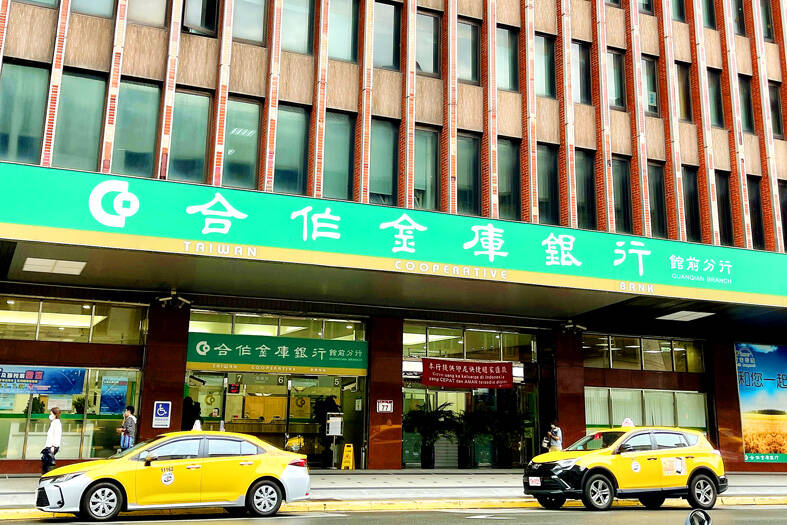State-run Taiwan Cooperative Bank (合作金庫商業銀行) has opened an office in the Czech Republic’s capital, Prague, to tap business opportunities in central Europe.
The banking arm of Taiwan Cooperative Financial Holding Co (合作金控) pressed ahead with plans to open the office despite the lingering COVID-19 pandemic.
Under chairman Lei Chung-dar (雷仲達), Taiwan Cooperative Financial has over the past few years expanded its global footprint in Asia, Europe, Australia and the US, aiming to boost revenue contributions from overseas operations.

Photo: George Tsorng, Taipei Times
The Prague office is intended to be a regional base of operations and might join forces with a subsidiary in Belgium to serve customers in developed western European nations, the lender said on Tuesday.
Taiwanese electronics makers Hon Hai Precision Industry Co (鴻海精密), Inventec Corp (英業達) and Wistron Corp (緯創資通), as well as beverage supplier King Car Industrial Co (金車), have created a presence in the Czech Republic, as bilateral trade ties are gaining momentum, the bank said.
Located in the center of Europe, the Czech Republic relies on tourism and industry as its main economic drivers, the lender said, adding that it has better infrastructure than eastern European countries, but lower personnel costs than western European markets, making it an ideal choice for developing business in central Europe.
The Prague office is Taiwan Cooperative Bank’s 26th overseas base of operations and the sixth established in the past five years.

TAKING STOCK: A Taiwanese cookware firm in Vietnam urged customers to assess inventory or place orders early so shipments can reach the US while tariffs are paused Taiwanese businesses in Vietnam are exploring alternatives after the White House imposed a 46 percent import duty on Vietnamese goods, following US President Donald Trump’s announcement of “reciprocal” tariffs on the US’ trading partners. Lo Shih-liang (羅世良), chairman of Brico Industry Co (裕茂工業), a Taiwanese company that manufactures cast iron cookware and stove components in Vietnam, said that more than 40 percent of his business was tied to the US market, describing the constant US policy shifts as an emotional roller coaster. “I work during the day and stay up all night watching the news. I’ve been following US news until 3am

UNCERTAINTY: Innolux activated a stringent supply chain management mechanism, as it did during the COVID-19 pandemic, to ensure optimal inventory levels for customers Flat-panel display makers AUO Corp (友達) and Innolux Corp (群創) yesterday said that about 12 to 20 percent of their display business is at risk of potential US tariffs and that they would relocate production or shipment destinations to mitigate the levies’ effects. US tariffs would have a direct impact of US$200 million on AUO’s revenue, company chairman Paul Peng (彭雙浪) told reporters on the sidelines of the Touch Taiwan trade show in Taipei yesterday. That would make up about 12 percent of the company’s overall revenue. To cope with the tariff uncertainty, AUO plans to allocate its production to manufacturing facilities in

Six years ago, LVMH’s billionaire CEO Bernard Arnault and US President Donald Trump cut the blue ribbon on a factory in rural Texas that would make designer handbags for Louis Vuitton, one of the world’s best-known luxury brands. However, since the high-profile opening, the factory has faced a host of problems limiting production, 11 former Louis Vuitton employees said. The site has consistently ranked among the worst-performing for Louis Vuitton globally, “significantly” underperforming other facilities, said three former Louis Vuitton workers and a senior industry source, who cited internal rankings shared with staff. The plant’s problems — which have not

COLLABORATION: Given Taiwan’s key position in global supply chains, the US firm is discussing strategies with local partners and clients to deal with global uncertainties Advanced Micro Devices Inc (AMD) yesterday said it is meeting with local ecosystem partners, including Taiwan Semiconductor Manufacturing Co (TSMC, 台積電), to discuss strategies, including long-term manufacturing, to navigate uncertainties such as US tariffs, as Taiwan occupies an important position in global supply chains. AMD chief executive officer Lisa Su (蘇姿丰) told reporters that Taiwan is an important part of the chip designer’s ecosystem and she is discussing with partners and customers in Taiwan to forge strong collaborations on different areas during this critical period. AMD has just become the first artificial-intelligence (AI) server chip customer of TSMC to utilize its advanced